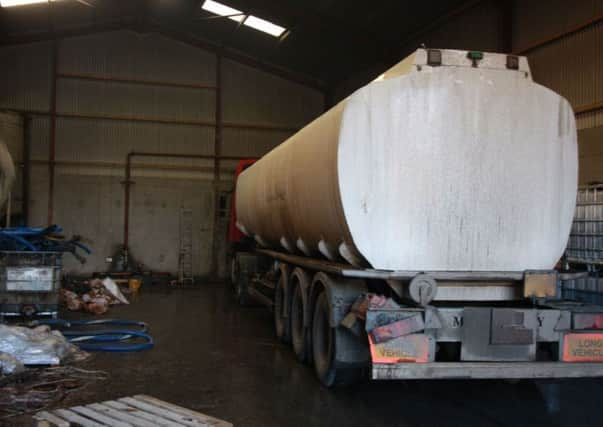Paisley blasts '˜shockingly lenient' sentences as fuel fraudsters walk free


In Great Britain sentencing for the offence is normally custodial, but critics have complained that fraudsters in Northern Ireland have virtually always been given suspended sentences.
On Tuesday in Newry Crown Court, Padraigh Doran, 33, Martin Fitzpatrick, 35, and Micheail Kennon, 25, were all given 18 months imprisonment suspended for three years in relation to a “sophisticated” diesel laundering plant in south Armagh, which had purpose-built underground storage to hide illegal fuel.
Advertisement
Hide AdAdvertisement
Hide AdHMRC officers began investigating the trio after a large plant was discovered at Kilnasaggart Road in the Jonesborough area in 2013.


The underground storage facility had the capacity to hold more than 100,000 litres of laundered fuel, with an agricultural shed built over the top in an attempt to disguise the illegal activity. The set-up was capable of producing 22 million litres of illicit fuel a year, evading £19.6m in lost duty and taxes.
HMRC officers seized 39,000 litres of laundered fuel, two fuel tankers, 62 bags of bleaching earth – used to launder the diesel – and 18,000 litres of toxic waste from the site. Doran was also sentenced for a separate fuel fraud offence after he was caught driving a van carrying 2,400 litres of laundered fuel in November 2014.
DUP Westminster candidate for North Antrim, Ian Paisley, has been involved in a range of high-level investigations into fuel fraud as a member of the Northern Ireland Affairs Committee at Westminster.
Advertisement
Hide AdAdvertisement
Hide AdHe said: “These are shockingly lenient sentences considering the damage to the environment and economy.


“I think suspended sentences send out a terribly lenient message. I have today written to the judicial authorities to appeal these sentences to see if they can be reviewed.”
An HMRC spokesman responded that it will make arrests for fuel fraud “where it is proportionate to do so, but prosecutions and sentencing are matters for the judiciary”.
He noted that two men were given custodial sentences in January for fuel fraud offences. The pair – one of them a convicted loyalist killer – were linked to fuel fraud on the Shankill Road and became the first known people to have been jailed for fuel fraud in Northern Ireland.
Advertisement
Hide AdAdvertisement
Hide AdJohn Whiting, assistant director with HM Revenue and Customs, said in 2013 that nobody had been jailed for fuel fraud in Northern Ireland in a decade, which he had raised in Parliament. He added: “In England and Wales the sentence is actually custodial, people are going to jail.”
Sentencing ‘a matter for individual judge’
The Lord Chief Justice’s office said that sentencing is a matter for each individual judge after consideration of the specific circumstances of each case.
“In calculating the appropriate sentence for the offence,” a spokeswoman said, “the judge will have considered a range of factors specific to that case including the seriousness of the offence, the offender’s previous convictions, aggravating and mitigating factors, whether the offender pleaded guilty and at what stage in the process – a guilty plea at an early stage will attract a greater discount.
“They will also consider the relevant law, including the maximum sentence which the court can impose, and any sentencing guidelines relevant to the offence committed.”
Advertisement
Hide AdAdvertisement
Hide AdThe director of public prosecutions can refer Crown Court cases to the Court of Appeal where he considers a sentence to be unduly lenient, she added.
The three men were Padraigh Doran, 33, a mechanic from Macullagh Road, Newtownhamilton, Martin Fitzpatrick, 35, a self-employed lorry driver from Main Street, Newry and Micheail Kennon, 25, an unemployed farmer from Newtown Road in Belleeks.